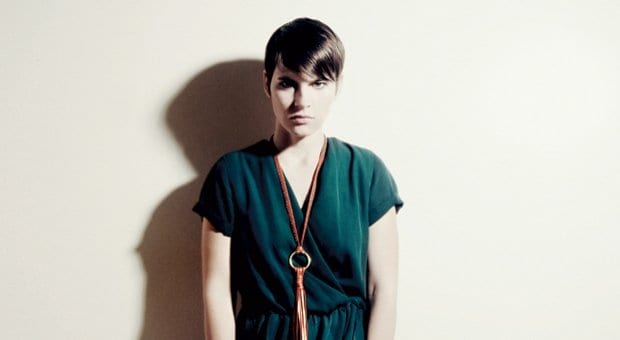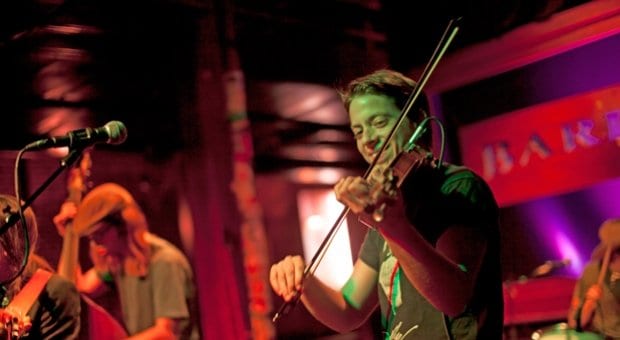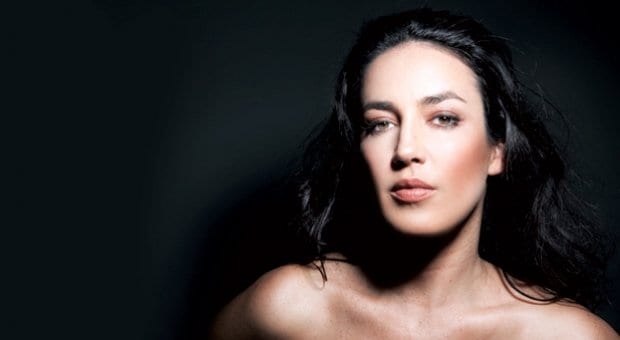
Kaki King admits she can’t stand the Indigo Girls’ acoustic guitar sound. Credit: Vancouver Folk Music Festival

Yosi Perlstein, from Hurray for the Riff Raff, prefers the independent folk-fest circuit. Credit: Joshua Shoemaker
She may be a talented instrumental guitarist, but Kaki King isn’t a fan of traditional folk music, queer or otherwise.
The New Yorker seems to shudder as she remembers the early days of queer folk music.
“Everyone loved the Indigo Girls, and I could not stand the sound of acoustic guitars being played like that,” she says, “so I sulked through the period and listened to PJ Harvey and The Cure and Depeche Mode.”
King, who is scheduled to play at the Vancouver Folk Music Festival this month, has performed with everyone from Foo Fighters to Timbaland and scored much of Sean Penn’s beautiful film Into the Wild.
Recently married, she now relishes the chance to share her queer perspective onstage. “I talk a lot about what that experience has been like, how it has changed my life and how important it is,” she says.
“For people who care about music, festivals are a really good way of supporting artists and seeing diversity,” says rapper and former Vancouverite Kinnie Starr.
“Folk festivals no longer just book folk,” Starr notes. “That is phasing out. Hip hop is folk music and storytelling culture.
“I think that is becoming more and more a part of folk festival mandates — to serve the audience as much diversity as possible,” she says.
“This is an opportunity to see all the music you want to see in an outdoor venue,” Starr points out. “You’re not stuck in a bar; you’re outside and you can really feel like you’re a part of something!”
Yosi Perlstein, Hurray for the Riff Raff’s charming trans guy/genderqueer fiddle player/drummer, prefers playing the independent folk fest circuit for a number of reasons.
“They give us a lot more room to be who we are,” he says.
“It feels a lot more acceptable in the independent world to have a transgender person in a band. We play so often in dive bars and small venues, and I always have to think, ‘Do I look like a boy or a girl right now?’ to decide which bathroom I should go into,” says Perlstein, whose New Orleans band is also scheduled to perform at the festival.
“Also, the music we play allows us to be who we are and not have to conform to be what’s going to sell on the radio.”
Hurray for the Riff Raff is a four-piece band that plays old-time twang. Founding members include Perlstein and Deep South–sounding vocalist Alynda Lee Segarra, who is in fact Puerto Rican and originally from the Bronx.
Perlstein still sees the importance of being out in public.
“At every show we do, I always want to present myself at least obviously queer, if not trans. I wanna be as out, as obvious, as possible, because I want people to see me and realize if I can do it, they can do it, too. And just to bring a queer presence to straight situations.”
Starr, too, hopes to empower people with her presence and music.
“I try to make music that makes people feel stronger,” she says, “by being myself and being true to my artistic forum: I’m female, I’m not black, and I write my own hip-hop beats, and I’ve been rapping for 15 years, so that is kind of outside the box.
“In a way, I think that empowers girls, straight or gay. I’m hoping that. I get seriously empowered when I see women excel!”
Hooray for the Riff Raff, “Look Out Mama”
youtube.com/watch?v=0g9nDsFHERM
Kinnie Starr, “Go Go See It”
youtube.com/watch?v=SmnFhyUKtiQ
Kaki King, “Can Anyone Who Has Heard This Music Really Be a Bad Person?”
youtube.com/watch?v=wnLJ2xdnf7k

 Why you can trust Xtra
Why you can trust Xtra


